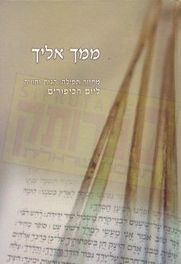וַיְהִי בִישֻׁרוּן, מֶלֶךְ, בְּהִתְאַסֵּף רָאשֵׁי עָם, יַחַד שִׁבְטֵי יִשְׂרָאֵל"And there was a King in Yeshurun (a reference to Israel), when the heads of the people gathered, together as the tribes of Israel." (D'varim 33:4)
This pasuk, taken from the torah reading of V'zor Hab'racha, the final parasha which is read on Simchat Torah, is a perfect one to summarize my Simchat Torah experience on the Upper West Side of Manhattan. Besides for having a wonderful chag overall, with new friends and old, I was proud to be a part of the two communities with which I celebrated Simchat Torah in the evening and the morning. Last night's festivities began with a festive Ma'ariv service with Koach, the Conservative group at Columbia's Hillel. After the service and the introductory verses to the Hakafot, we danced the Sefer Torah from the Hillel building down the street to the Roone Arledge Auditorium, the largest room in Columbia's student center, which has hosted such little-known figures like Mahmoud Ahmadinejad, Barack Obama and John McCain. After a few minutes, we were joined by Yavneh, Hillel's orthodox group, and soon we began our annual joint hakafot, an amazing show in Jewish unity. Separated by a diviaion of low folding tables, the entire community danced in an arrangement known as a trichitza, with a mens section, womens section and a mixed section. Each segment had one sefer torah, and we even attempted to dance to the same songs in each section. I experienced much intense joy for a number of reasons. First of all, it was wonderful that our entire Hillel community could come together on such a joyous occasion with so few barriers, so that we truly felt united in our celebration of Torah and Judaism. Secondly, I was proud to be a part of the mixed section of the dancing; as a traditional Conservative Jew who believes in the permissability of mixed dancing, I was proud to see the vitality of our celebration, inclusding the attendance of regulars and those aren't generally shulgoers.
The celebration came to a climax for the 7th Hakafah, as we danced the sifrei torah out of the auditorium, up Braodway, and into the main Columbia gates, as we had the final hakafah outside on Low Plaza. It was an amazing felling of Jewish pride as we celebrated in the center of the Columbia campus. At one point, we successfully formed a large circle around the plaza with everyone present, and sang Achainu and Hatikva with everyone present, which was truly a spiritual moment for me. Around 11:15, we began to dance the sifrei Torah back to Hillel, at which point I joied Yavneh for a joyous Torah reading [Traditionally, the Torah is not read at night. However, there is also an idea that we do not take a Torah from the Aron Kodesh without reading from it, so many have the custom to read the beginning of V'zot Hab'racha]. Although I'm told that some hakafot went into the wee hours of the morning, I actually hung out for a short while before I got some sleep so I could wake up on time for shul the next morning.
I spent Simchat Torah morning with Kehilat Hadar, an independent traditional/egalitarian community, which met at local Conservative shul Ansche Chesed. They pulled all the stops with having a ruach filled davening and hakafot, so much so that I left after the silent Amidah of musaf (around 2:30) because I was late for lunch! There was plenty of singing, even in p'sukei d'zimra, and a joyous hallel, followed by a rousing hakafot. Often in my childhood, I remember Simchat Torah being fun, but I think it says a lot that I felt quite exhausted after all the dancing this year! By the end of hakafot and beginning of Torah reading, there were a few hundred people present, which meant that it took about an hour and a half for everyone to have an aliyah, even with 5 Torah readers. Although the Ba'alei K'riah were great (including a few kids of Conservative rabbis), I followed the lead of a few others and decided to read my own aliyah!
And not to forget our lead-in pasuk, Hadar's services also represented Yachad Shivtei Yisrael. I saw dozens of friends there from all different stages of my life, and from across the spectrum of belief and observance.
This year's experiences reminded me of true meaning of the holiday - The Torah belongs to all of Israel, if only we will take ownership of it, however it speaks to us.
I spent Simchat Torah morning with Kehilat Hadar, an independent traditional/egalitarian community, which met at local Conservative shul Ansche Chesed. They pulled all the stops with having a ruach filled davening and hakafot, so much so that I left after the silent Amidah of musaf (around 2:30) because I was late for lunch! There was plenty of singing, even in p'sukei d'zimra, and a joyous hallel, followed by a rousing hakafot. Often in my childhood, I remember Simchat Torah being fun, but I think it says a lot that I felt quite exhausted after all the dancing this year! By the end of hakafot and beginning of Torah reading, there were a few hundred people present, which meant that it took about an hour and a half for everyone to have an aliyah, even with 5 Torah readers. Although the Ba'alei K'riah were great (including a few kids of Conservative rabbis), I followed the lead of a few others and decided to read my own aliyah!
And not to forget our lead-in pasuk, Hadar's services also represented Yachad Shivtei Yisrael. I saw dozens of friends there from all different stages of my life, and from across the spectrum of belief and observance.
This year's experiences reminded me of true meaning of the holiday - The Torah belongs to all of Israel, if only we will take ownership of it, however it speaks to us.
